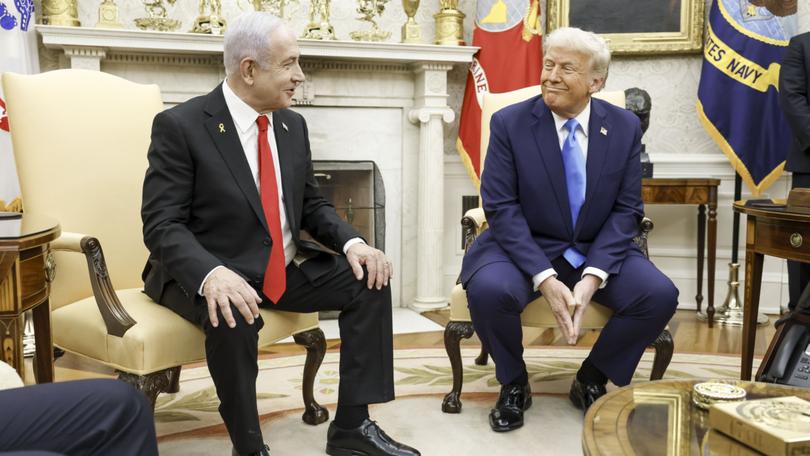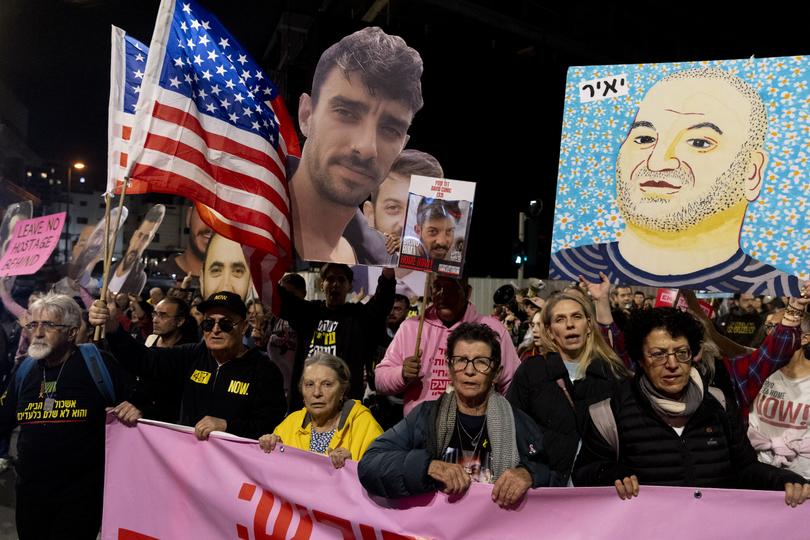Trump says US will take over ‘part of’ Gaza to create ‘Riviera of the Middle East’
The US President’s audacious proposal followed his suggestion that Palestinians displaced from the enclave should be permanently resettled outside the war-torn territory.

President Donald Trump on Tuesday suggested that displaced Palestinians in Gaza be permanently resettled outside the war-torn territory and proposed the US take “ownership” in redeveloping the area.
Mr Trump’s audacious proposal appears certain to roil the next stage of talks meant to extend the tenuous ceasefire between Israel and Hamas and secure the release of the remaining hostages held in Gaza.
The provocative comments came as talks are ramping up this week with the promise of surging humanitarian aid and reconstruction supplies to help the people of Gaza recover after more than 15 months of devastating conflict. Now Mr Trump wants to push roughly 1.8 million people to leave the land they have called home and claim it for the US, perhaps with American troops.
Sign up to The Nightly's newsletters.
Get the first look at the digital newspaper, curated daily stories and breaking headlines delivered to your inbox.
By continuing you agree to our Terms and Privacy Policy.Mr Trump outlined his thinking as he held talks with Israeli Prime Minister Benjamin Netanyahu at the White House, where the two leaders also discussed the fragile ceasefire and hostage deal in the Israeli-Hamas conflict and shared concerns about Iran.
“I don’t think people should be going back,” Mr Trump said. “You can’t live in Gaza right now. I think we need another location. I think it should be a location that’s going to make people happy.”
Mr Trump said the US would take ownership of the Gaza Strip and redevelop it after Palestinians are resettled elsewhere and turn the territory into “the Riviera of the Middle East” in which the “world’s people” — including Palestinians — would live.
“We’ll make sure that it’s done world class,” Mr Trump said. “It’ll be wonderful for the people — Palestinians, Palestinians mostly, we’re talking about.”
Egypt, Jordan and other US allies in the Mideast have cautioned Mr Trump that relocating Palestinians from Gaza would threaten Mideast stability, risk expanding the conflict and undermine a decades-long push by the US and allies for a two-state solution.
Still, Mr Trump insists the Palestinians “have no alternative” but to leave the “big pile of rubble” that is Gaza. He spoke out as his top aides stressed that a three-to-five-year timeline for reconstruction of the war-torn territory, as laid out in a temporary truce agreement, is not viable.
Last week, both Egyptian President Abdel Fattah el-Sissi and Jordanian King Abdullah II dismissed Mr Trump’s calls to resettle Gazans.
But Mr Trump said he believes Egypt and Jordan — as well as other countries, which he did not name — will ultimately agree to take in Palestinians.
“You look over the decades, it’s all death in Gaza,” Mr Trump said. “This has been happening for years. It’s all death. If we can get a beautiful area to resettle people, permanently, in nice homes where they can be happy and not be shot and not be killed and not be knifed to death like what’s happening in Gaza.”
Mr Trump also said he isn’t ruling out deploying US troops to support reconstruction of Gaza. He envisions “long-term” US ownership of a redevelopment of the territory.
“We’ll do what is necessary,” Mr Trump said about the possibility of deploying American troops to fill any security vacuum.
The White House’s focus on the future of Gaza comes as the nascent truce between Israel and Hamas hangs in the balance.
Mr Netanyahu is facing competing pressure from his right-wing coalition to end a temporary truce against Hamas militants in Gaza and from war-weary Israelis who want the remaining hostages home and for the 15-month conflict to end.
Saudi Arabia, the United Arab Emirates, Qatar, the Palestinian Authority and the Arab League joined Egypt and Jordan in rejecting plans to move Palestinians out of their territories in Gaza and the occupied West Bank.
Mr Trump may be betting he can persuade Egypt and Jordan to come around to accept displaced Palestinians because of the significant aid that the US provides Cairo and Amman. Hard-line right-wing members of Mr Netanyahu’s government have embraced the call to move displaced Palestinians out of Gaza.
“To me, it is unfair to explain to Palestinians that they might be back in five years,” Mr Trump’s Mideast envoy, Steve Witkoff, told reporters. “That’s just preposterous.”
Mr Trump also signalled that he may be reconsidering an independent Palestinian state as part of a broader two-state solution to the decades-long Israel-Palestinian conflict. “Well, a lot of plans change with time,” he told reporters when asked if he was still committed to a plan like the one he laid out in 2020 that called for a Palestinian state. “A lot of death has occurred since I left and now came back.”
Mr Netanyahu’s arrival in Washington for the first foreign leader visit of Mr Trump’s second term coincides with the prime minister’s popular support sagging.
The prime minister is in the middle of weekslong testimony in an ongoing corruption trial that centres on allegations he exchanged favors with media moguls and wealthy associates. He has decried the accusations and said he is the victim of a “witch hunt.”
Being seen with Mr Trump, who is popular in Israel, could help distract the public from the trial and boost Netanyahu’s standing.
“We have the right leader of Israel who’s done a great job,” Mr Trump said of Mr Netanyahu.

Mr Netanyahu also praised Mr Trump’s leadership in getting the hostage and ceasefire deal. “I’ll just tell you, I am happy they are here,” Mr Netanyahu said of Mr Trump and his administration.
It’s Mr Netanyahu’s first travel outside Israel since the International Criminal Court issued arrest warrants in November for him, his former defence minister and Hamas’ slain military chief, accusing them of crimes against humanity during the war in Gaza. The US does not recognise the ICC’s authority over its citizens or territory.
Mr Netanyahu met with White House national security adviser Mike Waltz and Mr Witkoff on Monday to begin the daunting work of brokering the next phase of a ceasefire agreement.
The Israeli leader said he would send a delegation to Qatar to continue indirect talks with Hamas that are being mediated by the Gulf Arab country, the first confirmation that those negotiations would continue. Mr Netanyahu also said he would convene his security Cabinet to discuss Israel’s demands for the next phase of the ceasefire when he returns to Israel at the end of the week.
Mr Witkoff, meanwhile, said he plans to meet with Qatar’s prime minister, Sheikh Mohammed bin Abdulrahman Al Thani, in Florida on Thursday to discuss the next phase in the ceasefire. Qatar and Egypt have served as key intermediaries with Hamas throughout the conflict.
Mr Netanyahu is under intense pressure from hard-right members of his governing coalition to abandon the ceasefire and resume fighting in Gaza to eliminate Hamas. Bezalel Smotrich, one of Mr Netanyahu’s key partners, vows to topple the government if the war isn’t relaunched, a step that could lead to early elections.
Hamas, which has reasserted control over Gaza since the ceasefire began last month, has said it will not release hostages in the second phase without an end to the war and Israeli forces’ full withdrawal. Mr Netanyahu, meanwhile, maintains that Israel is committed to victory over Hamas and the return of all hostages captured in the October 7, 2023 attack that triggered the war.
The two leaders also discussed Iran’s nuclear program. Ahead of his meeting with Mr Netanyahu, Mr Trump signed an executive order that he said would increase economic pressure on Iran.
“We’re not going to allow them to have a nuclear weapon,” Mr Trump said.
